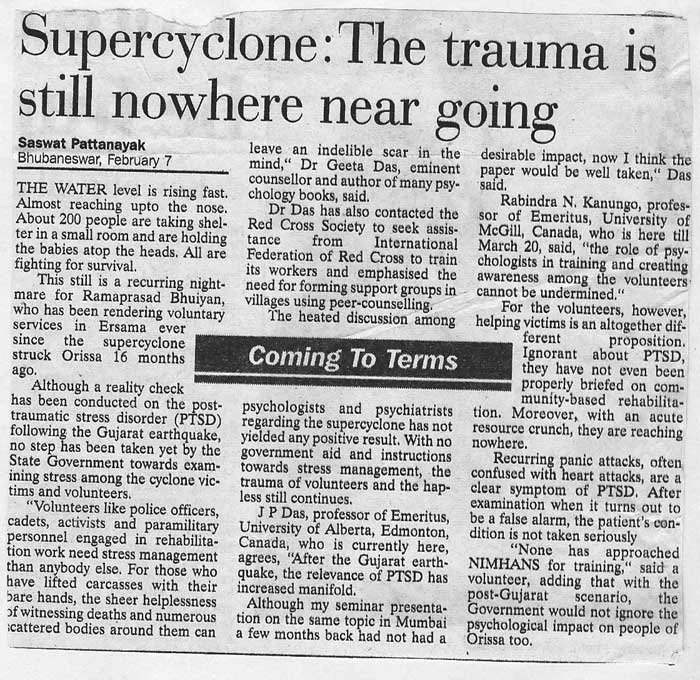Supercyclone: The trauma is still nowhere near going
Sixteen months after the supercyclone, survivors and volunteers in Orissa continue to grapple with deep psychological scars. This report explores the neglected reality of post-traumatic stress disorder among victims and relief workers — and the urgent need for counseling and community support.
By Saswat Pattanayak
Hindustan Times
The water level is rising fast — almost reaching up to the nose. About 200 people are taking shelter in a small room and are holding the babies atop their heads. All are fighting for survival.
This is still a recurring nightmare for Ramaprasad Bhuiyan, who has been rendering voluntary services in Ersama ever since the supercyclone struck Orissa 16 months ago.
Although a reality check has been conducted on post-traumatic stress disorder (PTSD) following the Gujarat earthquake, no step has been taken yet by the State Government to examine stress among the cyclone victims and volunteers.
“Volunteers like police officers, government aides and paramilitary personnel need special rehabilitation and counseling more than anybody else. They have seen the worst: carrying bodies with bare hands, witnessing deaths, and seeing dismembered bodies around them can leave an indelible scar in the mind,” said Dr. Geeta Das, eminent counsellor and author of many psychology books.
Dr. Das has also contacted the Red Cross Society to seek assistance from the International Federation of Red Cross to train its workers, and emphasized the need for forming support groups in villages through peer-counselling.
The discussion among psychologists and psychiatrists regarding the supercyclone has not yet yielded any positive result. With no government aid or instruction on stress management, the role of volunteers and the hapless victims continues to go unrecognized.
J.P. Das, Professor Emeritus at the University of Alberta, Edmonton, Canada, who is currently in Bhubaneswar, said: “After the Gujarat earthquake, the relevance of PTSD has increased manifold.”
Although many seminar presentations on the same topic in Mumbai a few months back had not had a desirable impact, “now I think the paper would be well taken,” Dr. Das said.
Rabindra N. Kanungo, Professor Emeritus, University of McGill, Canada, added: “The role of psychologists in training and creating awareness among the volunteers cannot be undermined.”
For the volunteers, however, helping victims is an altogether different proposition. Ignorant about PTSD, they have not even been properly briefed on community-based rehabilitation. Moreover, with an acute resource crunch, they are reaching nowhere.
Recurring panic attacks, often confused with heart attacks, are a clear symptom of PTSD. After examination, when it is verified that the condition is not taken seriously enough, “we are approaching NIMHANS for training,” said a volunteer. Based on the post-Gujarat scenario, the government would not ignore the psychological impact on the people of Orissa too.
